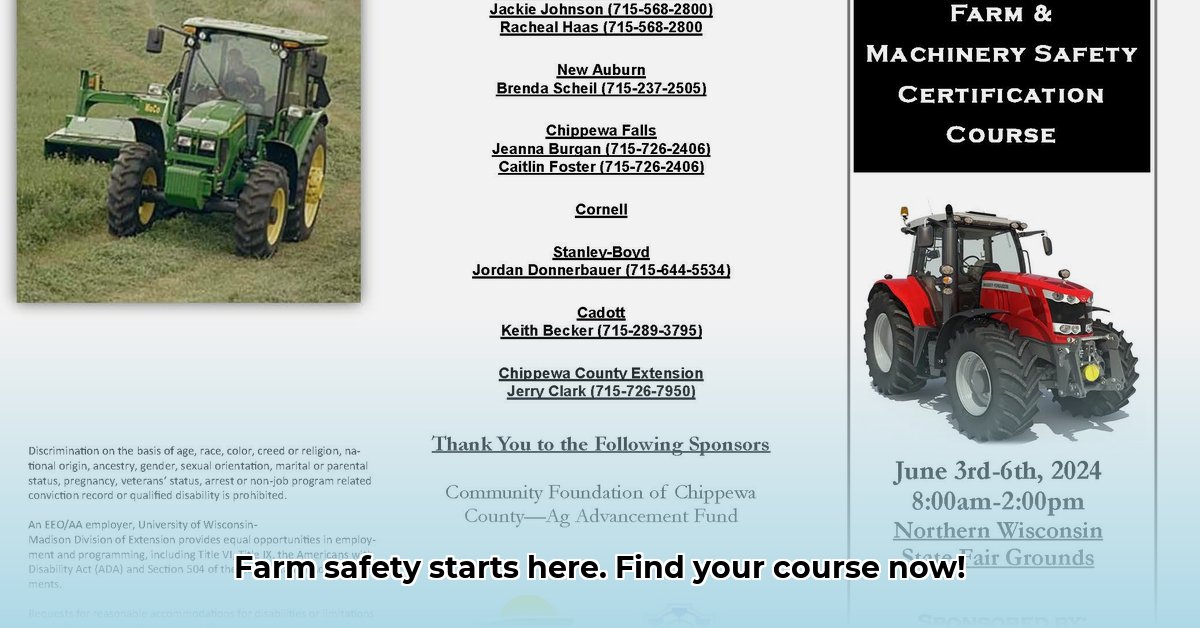
Farming is demanding, and operating heavy machinery like tractors presents significant risks. Are you prepared to handle the challenges and potential dangers? This comprehensive guide will help you locate a top-notch tractor safety course near you and equip you with the knowledge and skills to operate safely and efficiently. Protecting yourself and others is paramount; let's make farm safety a priority.
Finding a Tractor Safety Course Near You: A Step-by-Step Guide
Finding the right tractor safety course doesn't have to be difficult. Follow these simple, effective steps to locate a program that meets your needs and contributes to a safer work environment:
Step 1: Online Search Strategies for Maximum Reach
Harness the power of the internet to pinpoint nearby courses. Employ specific search terms like:
- "tractor safety course [your state/zip code]"
- "agricultural equipment safety training near me"
- "farm machinery operation certification [your region]"
Refine your search by adding filters for distance and course duration. Carefully review course descriptions and examine online reviews to gauge the quality and reputation of potential providers. Did the course meet your expectations? Would you recommend it to others?
Step 2: Utilizing Local Resources: Expanding Your Search Net
Explore these key local resources to find courses that may not appear in internet searches:
- Agricultural Extension Offices: These offices often offer or direct you to valuable tractor safety resources and training opportunities in your region. Contact the nearest office. They are an excellent starting point.
- Farm Bureaus: Similarly, farm bureaus usually provide information on safety training programs and connect you with other farmers in your area.
- Vocational Schools and Community Colleges: Many educational institutions offer agricultural programs, frequently including comprehensive tractor safety courses. Check their online catalogs or contact their agricultural departments.
- Local Agricultural Organizations: Don't overlook local farmers' cooperatives or agricultural associations. They often know about relevant safety training within the community.
Step 3: Prioritizing Certification and Accreditation: Ensuring Quality
Choosing a course with nationally recognized certifications or affiliations with established agricultural organizations ensures high educational standards and comprehensive training. Look for certifications from reputable bodies—this demonstrates a commitment to quality instruction and best practices. A nationally recognized certification signals a course with a strong curriculum.
What to Look for in a Reputable Tractor Safety Course: A Detailed Checklist
Not all tractor safety courses are created equal. To maximize your learning and ensure a safe farming experience, carefully consider the following crucial factors when selecting a program:
- Comprehensive Curriculum: A quality course covers theoretical knowledge and extensive hands-on practical training. Expect detailed instruction on various tractor types, safe operating procedures for diverse terrains, preventative maintenance, and comprehensive emergency procedures. Should the course cover all aspects of safe operation?
- Expert Instructors: Seek out instructors with extensive experience working with tractors and proven teaching ability. Verify their qualifications, certifications, and experience in the field. Look for individuals with established reputations and specialized knowledge.
- Course Duration and Intensity: A short course often lacks the depth needed for comprehensive safety training. Choose a course of adequate duration to allow for sufficient time for both theoretical instruction and ample hands-on practice.
- Student-to-Instructor Ratio: A smaller class size ensures personalized attention, allowing instructors to monitor your progress more closely and address individual questions. A lower student-to-instructor ratio improves learning.
- Safety Equipment and Facilities: The training environment must prioritize safety. The facilities should be well-maintained, equipped with necessary safety equipment, and provide a safe environment for hands-on instruction.
Beyond the Course: Maintaining Tractor Safety for Long-Term Success
Completing a tractor safety course is crucial, but it's only the beginning. Continuous adherence to safe practices ensures a safer work environment and long-term success.
- Regular Maintenance: Regular maintenance is vital. Schedule preventative maintenance checks and promptly address any issues to prevent malfunctions. (Regular maintenance minimizes risks.)
- Pre-Operation Checks: Implement a thorough pre-operation inspection checklist before each use. Check fluids, tires, brakes, and all operating components. (Pre-operation checks prevent accidents.)
- Safe Operating Procedures: Always adhere to safe operating procedures. Never rush, and always prioritize safety. (Following safe procedures protects your life and the lives of others.)
- Weather Awareness: Never operate a tractor in hazardous weather conditions. Postpone operation if weather is unsafe. (Weather awareness is essential for farm safety.)
By diligently following these guidelines, you significantly improve your safety and contribute to a safer farming environment for yourself and your team. Remember, proactive safety measures are an investment in a successful and sustainable future. A safe farm is a productive farm.